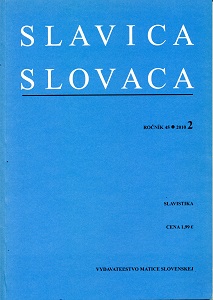Osobitosti kodifikácie spisovnej macedónčiny
Specific Features of Codification of the Macedonian Literary Language
Author(s): Emil HorákSubject(s): Language studies
Published by: SAV - Slovenská akadémia vied - Slovenský komitét slavistov a Slavistický ústav Jána Stanislava SAV, v.v.i.
Keywords: Codification of Slavic literary languages; convergent and divergent tendencies; language codification and politics; literary language and nation states; the name of a literary language; Bulgarian-Macedonian language query.
Summary/Abstract: The political and social changes during the 1990’s enabled the establishment of several new Slavic literary languages. The study of the origins and nature of these literary languages shed a new light also on codification of the Macedonian literary language. Thus, the literary Macedonian language not only ceased to be a chronologically „youngest Slavic literary language“, but also some of the principles of its codification predetermined some significant aspects of the origins of new Slavic literary languages. Whereas the literary Macedonian language--with respect to its origin--is related to the Slavic languages codified in the middle of the 19th century on the basis of classical codification principles, its relationship with new Slavic languages from the end of the 1990’s is based on the establishment of independent nation states, in which the language fulfills the function of a national language and, as such, is viewed as a symbol of a sovereign state. In this respect, the Macedonian literary language plays a central role among the other Slavic literary languages in both historical perspective and the content level.
Journal: Slavica Slovaca
- Issue Year: 45/2010
- Issue No: 02
- Page Range: 124-128
- Page Count: 5
- Language: Slovak

